By Rev. Kerry Gibbs
Introduction
Have you ever dropped a Big Lebowski quote into a conversation only to be met by a blank stare that says: “What the fuck are you blathering about?” Or maybe you’ve let slip with a “The Chinaman is not the issue here” and from an unexpected quarter comes the response: “Chinaman is not the preferred nomenclature, Dude.” There are plenty of people out there that still dig The Dude’s style and there are also plenty who are asking “What the Fuck has anything got to do with The Big Lebowski?” Many people self-identify as Dudeists – a couple of hundred thousand at last count – but what makes a Dudeist a Dudeist? Is it being prepared with a Big Lebowski quote whatever the situation? Is it wearing a bathrobe on a weekday? (Sure, that, and a pair of jellies). Is The Dude’s revolution over, have the bums lost? Or will the whole durn “stoner-comedy” keep perpetuatin’ itself, down through the generations and across the sands of time?
My train of thought began when I read an article in This Year’s Work in Lebowski Studies. Back in 2006 Richard Gaughran of James Madison University (aka “Professor Dude”) conducted a survey of 180 college students. The Professor was trying to get at what students think of “The Dude” and whether that would “reveal something about the current generation of students – their view of themselves and the world in which they live” (p.355). Professor Dude only wanted to survey kids who had actually seen The Big Lebowski because, let’s face it, if you haven’t, you would clearly be out of your element. So he started by asking for those who had seen the film to raise their hands. What happened next is interesting, man:
 One of the first things I noticed, and some cooperating colleagues said the same, was the way classes split between those who have seen the film and those who haven’t. In upper-level English classes most students have seen it; in lower-level general education courses most have not. And those who have seen it expressed indignation toward their classmates who haven’t seen the film. ‘What? You haven’t seen it? What’s the matter with you?’ (p.356).
One of the first things I noticed, and some cooperating colleagues said the same, was the way classes split between those who have seen the film and those who haven’t. In upper-level English classes most students have seen it; in lower-level general education courses most have not. And those who have seen it expressed indignation toward their classmates who haven’t seen the film. ‘What? You haven’t seen it? What’s the matter with you?’ (p.356).
Professor Dude asked the kids how many times they had seen the film and how highly they regard it. Approximately 70 of the 180 students claimed to have seen it five times or more which, in my opinion, makes them fucking amateurs, but most of them did say it was one of their favorite films or they like it a lot. Asked for definitions concerning “Dudeness” or Dude-like qualities the students came up with over sixty words or phrases, mostly positive. However, when asked for extended remarks about The Dude there was more ambivalence. “The unambiguously positive respondents outnumbered the negative ones by two to one, but both groups were vastly outnumbered by those who expressed themselves ambivalently” (p.358).
When I read the Professor’s work I thought “Well, that’s interesting, man. I wonder what results you’d get if you asked a bunch of Dudeists similar questions?” So, I just dropped in to see what condition our condition is in.
Methods
The beauty of this plan was its simplicity, like a Swiss-fucking-watch. With the help of Oliver Benjamin (aka The Dudely Lama) I posted the following survey to the Dudeism Facebook page on September 28th 2013:
One of our Dudeist Priests is trying to gain some insight into the greatest story ever blathered. Please answer the questions below in the comment section. It would really help tie his ‘room-inations’ together.
Thankee.
1. How many times (approximately) have you watched The Big Lebowski?
2. Describe ‘The Dude’ in one word.
3. Do you think it is possible, or desirable, to live like ‘The Dude’?
4. What year were you born?
 Then I waited for the responses and printed them out. Once the results were printed, I did absolutely nothing for about four months. My next step was to have an actual scientist, Dr. Lia O’Brien (aka My Special Lady) enter the results into a fancy science machine.
Then I waited for the responses and printed them out. Once the results were printed, I did absolutely nothing for about four months. My next step was to have an actual scientist, Dr. Lia O’Brien (aka My Special Lady) enter the results into a fancy science machine.
The first three questions were designed with Professor Dude’s survey in mind, so as to be able to compare his student’s answers with those provided by Dudeists. To make analysis easier, I divided the respondents’ answer to the first question into five groups based on how many times they had watched the film:
1. 1 or 2 times
2. 3 – 5 times
3. 6 – 10 times
4. 11 – 50 times
5. 50 +
I assessed the second question on the basis of whether the word used to describe The Dude was “positive,” “negative” or “neutral.”
The third question was split in two and assessed on a simple yes or no basis as to whether it was (1) “possible” and (2) “desirable” to live like The Dude.
The last question was added to see if there was a generational aspect to people’s view of The Dude. When analyzing the data I placed each respondent into a particular generational cohort based on their year of birth. Now, I am aware that Generations don’t stop and start at social scientists’ convenience but for sake of argument I used the generational birth years outlined in the book Generations by William Strauss and Neil Howe (aka Smarter Fellas than myself). Thus, for the purpose of this paper I am defining the relevant generations as follows:
The Silent Generation – Born between 1925 and 1942
The Baby Boomers – Born between 1943 and 1960
Generation X – Born between 1961 and 1981
Millenials (aka Gen. Y) – Born between 1982 and 2003
Results
 Amazingly I got over 850 responses as well as over 1000 “likes.” As you would expect there was a fair amount of stone-walling mostly of the “Er, sorry, I wasn’t listening” and “Is this your homework, Larry?” variety. But there were 614 people who actually answered all the questions without being facetious, and proud we are of all of them. Of those 614, the vast majority were either Gen X or Millenials with just slightly more Gen Xers (284 vs. 268 Millenials). Just 6 respondents were from the Silent Generation which is the generation with which The Dude would self-identify. The Baby Boom Generation provided 56 respondents.
Amazingly I got over 850 responses as well as over 1000 “likes.” As you would expect there was a fair amount of stone-walling mostly of the “Er, sorry, I wasn’t listening” and “Is this your homework, Larry?” variety. But there were 614 people who actually answered all the questions without being facetious, and proud we are of all of them. Of those 614, the vast majority were either Gen X or Millenials with just slightly more Gen Xers (284 vs. 268 Millenials). Just 6 respondents were from the Silent Generation which is the generation with which The Dude would self-identify. The Baby Boom Generation provided 56 respondents.
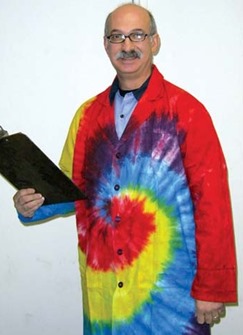 268 respondents claimed to have seen the film 50 times or more, while 284 fell into the 11-50 group. Six respondents said they had only seen it 1 or 2 times. I didn’t ask the question about whether or not respondents had a favorable view of the film because I assumed that if you are following the Dudeism Facebook page you probably like the movie. Also, as Professor Dude noted: “Not surprisingly, there’s a correlation between how many times a student has seen the film and favorable opinion of it” (p.356). Given that 552 of 614 respondents claimed to have seen The Big Lebowski ten times or more, I think we can safely say they have a mostly favorable view of it.
268 respondents claimed to have seen the film 50 times or more, while 284 fell into the 11-50 group. Six respondents said they had only seen it 1 or 2 times. I didn’t ask the question about whether or not respondents had a favorable view of the film because I assumed that if you are following the Dudeism Facebook page you probably like the movie. Also, as Professor Dude noted: “Not surprisingly, there’s a correlation between how many times a student has seen the film and favorable opinion of it” (p.356). Given that 552 of 614 respondents claimed to have seen The Big Lebowski ten times or more, I think we can safely say they have a mostly favorable view of it.
However, I was interested to see if a generally favorable view of the film translated to a favorable opinion of The Dude. Now, when Professor Dude asked his students for definitions of “Dudeness” or Dude-like qualities he was “surprised to learn that the English language has so many [synonyms] for this quality” (p.356). He recorded over 60 different words or phrases. Not to be outdone, the respondents to my survey came up with well over 70 discrete words to describe The Dude, and that is after I lumped together words that were similar like “stoner,” “stoned” and “high”.
Unsurprisingly, “Dude,” or some derivation thereof, was the most popular response with 113 out of the 614. Some variation of “Abides,” “Abiding,” “Abider,” or –my personal favorite – “elabiderino” (if you’re not into the whole brevity thing) came in second with 77 responses. Other popular responses were “Chill” (37), “Zen” (33), “Mellow” (16), and “Easygoing” (15). The most used negative word was “Lazy” (33). Several respondents came up with creative designations for The Dude. In particular, I enjoyed “Roll-model” and “Motherfuckingdopeasshit” which I guess is one word if you type it like that.
The words chosen were overwhelming positive. I designated “Lazy,” “Slacker,” “Stoner” etc. as negative, because that is how they are traditionally meant, although it is not at all clear that they were meant pejoratively by the respondents in question. Several people who described The Dude as “Lazy” also answered that his lifestyle was both possible and desirable.
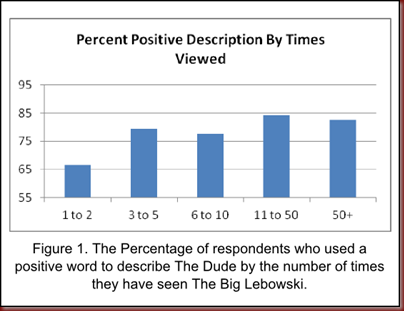 Interestingly, there was not a straight correlation between the number of times someone had seen the film and the use of a positive word to describe The Dude. As can be seen from Figure 1, a higher percentage of those who had seen it between 10 and 50 times used a positive word than those who had seen it 50 times or more. The graph does show a basic correlation between number of views and positive words but it is not clear cut. However, this may be due to the fact that, as I mentioned above, a Dudeist may not be using a word like “Lazy” in its traditional negative sense.
Interestingly, there was not a straight correlation between the number of times someone had seen the film and the use of a positive word to describe The Dude. As can be seen from Figure 1, a higher percentage of those who had seen it between 10 and 50 times used a positive word than those who had seen it 50 times or more. The graph does show a basic correlation between number of views and positive words but it is not clear cut. However, this may be due to the fact that, as I mentioned above, a Dudeist may not be using a word like “Lazy” in its traditional negative sense.
The third question: “Do you think it is possible, or desirable to live like ‘The Dude’?” was of particular interest to me. I was wondering if I would find the same ambivalence about The Dude’s lifestyle that the Professor had noted. Figure 2 is very interesting because it shows a very clear correlation between the number of times a person has watched The Big Lebowski and whether they think living like The Dude is desirable. In Figure 3 we can see that there is some ambivalence, clearly not everyone thinks it is both desirable and possible to live like The Dude. However, the results are not what you might expect. Amongst those that have seen the film 50 or more times there are a high percentage that think it both desirable and possible with slightly more thinking it desirable than possible. This holds true for those that have seen it between 11 and 50 times and between 6 and 10 times just with lower percentages overall for both answers. The really interesting statistics surface when you examine those who have seen it less than 5 times. In the case of those who have seen the film 3-5 times or just one or two the percentages are reversed. In other words, they are more likely to think it is possible but not desirable to live like The Dude (Fig. 3).
What might explain this trend? The relationship between the number of times that a person has viewed the film and their opinion regarding the desirability of The Dude’s lifestyle can be easily explained. Clearly, the more you dig The Dude’s style the more you will want to watch him in action and almost certainly the reverse is true; the more you watch The Dude the more you will dig his style. However, why would someone who has watched the film 5 times or less be almost as likely to think The Dude’s lifestyle possible as someone who has seen it 50 times or more? In addition why are they more likely to think it possible but not desirable? It seems to me that those who have watched the film fewer times are more likely to respond to the question in terms of the physical reality of The Dude’s life rather than the ethos of “Dudeliness.” That is to say, they are thinking “Is it possible to be an unemployed ex-Metallica Roady who can’t pay his rent but likes to bowl and smoke weed?” Answer: “Yes, it’s possible”. “Is it desirable?” “Not really”. Whereas, those who have viewed the film several times have absorbed more of The Dude’s thinking and are able to separate “Dudeliness” from the particulars of The Dude’s life.
Several respondents actually made this point. Here are a few examples: “Logistically no, but mentally absolutely.” “In regards to his ethos, definitely yes. But in regards to his physical living conditions, maybe …” “I think it is possible, and desirable. Not necessarily to live in near squalor, but desirable to be as close to enlightenment as the Dude is.” “It is more important to capture the spirit in which he lives.” “In attitude and spiritually, but not entirely physically.” “It’s his state of being relaxed about the world’s absurdity, not the particulars of his life, that matter.”
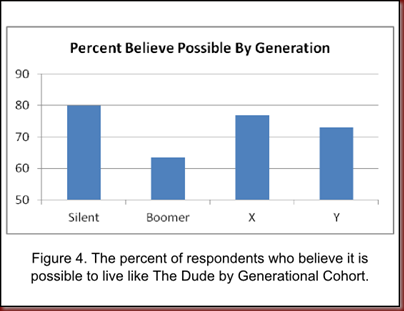 Now, the fourth question: “What year were you born?” was an attempt to see if there was a generational aspect to the case. Only 6 of the respondents came from the so-called “Silent Generation” (born 1925-1942) which a real scientist would throw out as statistically insignificant. I for one am happy to know that some of The Dude’s compeers are out there takin’ it easy for all us younger sinners. It is also totally possible that the survey method itself created a bias towards younger respondents. There may be thousands of “Silents” out there watching The Big Lebowski on VHS, listening to Creedence and having the occasional acid flashback but they are not necessarily getting on The Facebook. Interestingly, 80% of those Silent Generation respondents said it was both desirable and possible to live like The Dude (Fig. 5). That is a higher possible percentage than any other generation. The Baby Boomers, on the other hand, had the lowest percentage saying it was possible (Fig. 4.)
Now, the fourth question: “What year were you born?” was an attempt to see if there was a generational aspect to the case. Only 6 of the respondents came from the so-called “Silent Generation” (born 1925-1942) which a real scientist would throw out as statistically insignificant. I for one am happy to know that some of The Dude’s compeers are out there takin’ it easy for all us younger sinners. It is also totally possible that the survey method itself created a bias towards younger respondents. There may be thousands of “Silents” out there watching The Big Lebowski on VHS, listening to Creedence and having the occasional acid flashback but they are not necessarily getting on The Facebook. Interestingly, 80% of those Silent Generation respondents said it was both desirable and possible to live like The Dude (Fig. 5). That is a higher possible percentage than any other generation. The Baby Boomers, on the other hand, had the lowest percentage saying it was possible (Fig. 4.)
As Figure 5 shows, in each generation a higher percentage of people thought it was desirable to live like The Dude than thought it was possible except for the Silents where 80% answered yes to both questions. Baby Boomers were the most likely to express ambivalence, with a significantly higher percentage saying it was desirable than those who thought it possible. Millenials had the highest percentage saying it was desirable but, like the Boomers, a significantly lower percentage believing it possible. This seems to mirror Professor Dude’s observation that the college students he spoke to expressed an enthusiasm for The Dude which was mitigated “by frustration that contemporary pressures and responsibilities make Dudeness difficult to embrace fully” (p.359).
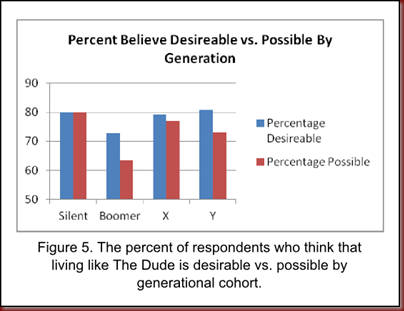 Apart from the “Silents,” the generation that expressed the least ambivalence about The Dude’s lifestyle was Generation X. Nearly 80% of Gen Xers thought The Dude’s lifestyle desirable and almost as many thought it also possible (Fig. 5). This deserves further investigation given that of all the generations, Gen X is the one that is currently in the midlife portion of the life-cycle which is traditionally the time of highest productivity and responsibility. It is one thing for a college kid or a retiree to desire The Dude’s lifestyle, but what does it mean for a middle-aged person with kids and other responsibilities?
Apart from the “Silents,” the generation that expressed the least ambivalence about The Dude’s lifestyle was Generation X. Nearly 80% of Gen Xers thought The Dude’s lifestyle desirable and almost as many thought it also possible (Fig. 5). This deserves further investigation given that of all the generations, Gen X is the one that is currently in the midlife portion of the life-cycle which is traditionally the time of highest productivity and responsibility. It is one thing for a college kid or a retiree to desire The Dude’s lifestyle, but what does it mean for a middle-aged person with kids and other responsibilities?
Discussion
 Anyway, before I lose my train of thought here, what is the point of this whole story I’ve been unfolding for you? Firstly, it would seem that Dudeists are just as good, if not better, than English Majors at coming up with creative ways to describe The Dude. Although I wish they didn’t have to cuss so durn much. Also, it seems that there are plenty of people out there that think it is desirable and possible to maintain a Dudely lifestyle even in a whole world gone crazy. I don’t know about you, but I take comfort in that. Perhaps most importantly, there appears to be plenty of the younger generation that are digging The Dude’s style even though it is almost 20 years since the release of The Big Lebowski although with some of the ambivalence that Professor Dude noted.
Anyway, before I lose my train of thought here, what is the point of this whole story I’ve been unfolding for you? Firstly, it would seem that Dudeists are just as good, if not better, than English Majors at coming up with creative ways to describe The Dude. Although I wish they didn’t have to cuss so durn much. Also, it seems that there are plenty of people out there that think it is desirable and possible to maintain a Dudely lifestyle even in a whole world gone crazy. I don’t know about you, but I take comfort in that. Perhaps most importantly, there appears to be plenty of the younger generation that are digging The Dude’s style even though it is almost 20 years since the release of The Big Lebowski although with some of the ambivalence that Professor Dude noted.
It’s also comforting that many Gen Xers are still seeking The Dude Way even in middle-age. Hopefully, that means there are more “little Lebowskis” on the way and that is how the whole durn human comedy will keep perpetuatin’ itself, down through the generations, westward the wagons, across the sands of time. But, look at me, I’m ramblin’ again…


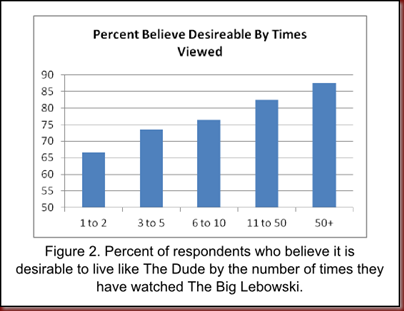
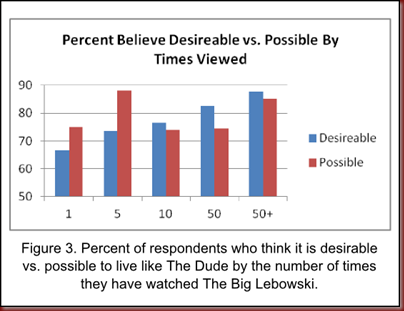

Great article, as a fellow dudeist myself I appreciate the depth that has been gone into to explore the statistics and facts of how people view the the dude in our modern day life. It sorta shows how the dudes lifestyle transcends all generations (to a certain extent).
Anyways, just admiring an awesome article that was “fuckin’ interesting.
I feel the Dude is an example to us western minds what the Asians and Hindus have been blathering about for well over 2000 years. While mataining a clear mind “limber mind” is the goal of eastern meditation it is not the way us westerners go about comprehending things. So think you o student of the great Dude for quantifying this here uncarved block.
This is bloody fantastic!